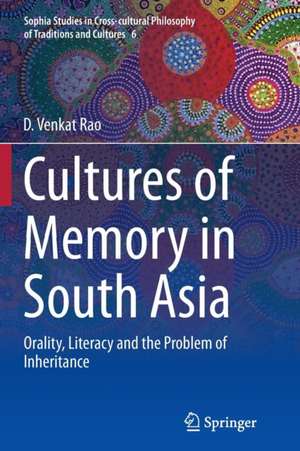Cultures of Memory in South Asia: Orality, Literacy and the Problem of Inheritance: Sophia Studies in Cross-cultural Philosophy of Traditions and Cultures, cartea 6
Autor D. Venkat Raoen Limba Engleză Paperback – 3 sep 2016
| Toate formatele și edițiile | Preț | Express |
|---|---|---|
| Paperback (1) | 587.48 lei 38-44 zile | |
| Springer India – 3 sep 2016 | 587.48 lei 38-44 zile | |
| Hardback (1) | 597.90 lei 38-44 zile | |
| Springer India – 15 mai 2014 | 597.90 lei 38-44 zile |
Din seria Sophia Studies in Cross-cultural Philosophy of Traditions and Cultures
-
 Preț: 395.25 lei
Preț: 395.25 lei - 18%
 Preț: 726.69 lei
Preț: 726.69 lei - 15%
 Preț: 701.72 lei
Preț: 701.72 lei - 15%
 Preț: 651.67 lei
Preț: 651.67 lei - 18%
 Preț: 736.32 lei
Preț: 736.32 lei - 18%
 Preț: 782.10 lei
Preț: 782.10 lei -
 Preț: 375.53 lei
Preț: 375.53 lei - 24%
 Preț: 1038.21 lei
Preț: 1038.21 lei -
 Preț: 375.45 lei
Preț: 375.45 lei - 20%
 Preț: 570.73 lei
Preț: 570.73 lei -
 Preț: 376.15 lei
Preț: 376.15 lei -
 Preț: 378.64 lei
Preț: 378.64 lei -
 Preț: 377.55 lei
Preț: 377.55 lei - 20%
 Preț: 559.21 lei
Preț: 559.21 lei - 20%
 Preț: 568.44 lei
Preț: 568.44 lei - 20%
 Preț: 511.16 lei
Preț: 511.16 lei - 20%
 Preț: 559.21 lei
Preț: 559.21 lei - 20%
 Preț: 567.63 lei
Preț: 567.63 lei - 24%
 Preț: 590.54 lei
Preț: 590.54 lei - 24%
 Preț: 794.98 lei
Preț: 794.98 lei - 24%
 Preț: 585.65 lei
Preț: 585.65 lei - 20%
 Preț: 521.58 lei
Preț: 521.58 lei -
 Preț: 378.64 lei
Preț: 378.64 lei -
 Preț: 479.29 lei
Preț: 479.29 lei - 20%
 Preț: 554.67 lei
Preț: 554.67 lei - 20%
 Preț: 569.86 lei
Preț: 569.86 lei - 15%
 Preț: 578.67 lei
Preț: 578.67 lei - 20%
 Preț: 556.90 lei
Preț: 556.90 lei - 18%
 Preț: 949.10 lei
Preț: 949.10 lei
Preț: 587.48 lei
Preț vechi: 772.99 lei
-24% Nou
Puncte Express: 881
Preț estimativ în valută:
112.43€ • 116.94$ • 92.82£
112.43€ • 116.94$ • 92.82£
Carte tipărită la comandă
Livrare economică 11-17 aprilie
Preluare comenzi: 021 569.72.76
Specificații
ISBN-13: 9788132235071
ISBN-10: 813223507X
Pagini: 352
Ilustrații: XVI, 336 p.
Dimensiuni: 155 x 235 x 19 mm
Greutate: 0.49 kg
Ediția:Softcover reprint of the original 1st ed. 2014
Editura: Springer India
Colecția Springer
Seria Sophia Studies in Cross-cultural Philosophy of Traditions and Cultures
Locul publicării:New Delhi, India
ISBN-10: 813223507X
Pagini: 352
Ilustrații: XVI, 336 p.
Dimensiuni: 155 x 235 x 19 mm
Greutate: 0.49 kg
Ediția:Softcover reprint of the original 1st ed. 2014
Editura: Springer India
Colecția Springer
Seria Sophia Studies in Cross-cultural Philosophy of Traditions and Cultures
Locul publicării:New Delhi, India
Cuprins
Chapter 1. Introduction: Through the Postcolonial Abyss.- Part I: Signatures of Memory.- Chapter 2. Configurations of Memory and the Work of Difference.- Chapter 3. Futures of the Past: Mnemocultures and the Question of Inheritance.- Part II: Mnemotexts of Reflection.- Chapter 4. Learning in the Double Bind: Mnemotextual Inquiries and Action Knowledge.- Chapter 5. Fables of Identity and Contingencies of Certainty: Disarticulations of the Panchatantra.- Chapter 6. Tanunapat: Kalos, Philos and the Vestiges of Trace.- Part III: Embodiments of Response.- Chapter 7. The Mahabharata Contretemps: Temporality, Finitude and the Modes of Being in the Itihasa.- Chapter 8. Responsive Receptions: The Question of Translation beyond the Accursed Zone.- Chapter 9. Listening to the Text looms of Vemana: Memory, History and the Archives of Betrayal.- Chapter 10. Close Ups: Approaching Critical Humanities.
Notă biografică
D. Venkat Rao teaches at the English and Foreign Languages University, Hyderabad. His earlier works include, In Citations: Readings in Area Studies of Culture (1999) and a translation of The Last Brahmin (2007). He writes in English and Telugu in the areas of literary and cultural studies, mnemocultures and comparative thought.
Textul de pe ultima copertă
Cultures of Memory in South Asia reconfigures European representations of India as a paradigmatic extension of a classical reading, which posits the relation between text and context in a determined way. It explores the South Asian cultural response to European “textual” inheritances. The main argument of this work is that the reflective and generative nodes of Indian cultural formations are located in the configurations of memory, the body and idiom (verbal and visual), where the body or the body complex becomes the performative effect and medium of articulated memories. This work advances its arguments by engaging with mnemocultures—cultures of memory—that survive and proliferate in speech and gesture. Drawing on Sanskrit and Telugu reflective sources, this work emphasizes the need to engage with cultural memory and the compositional modes of Indian reflective traditions. This important and original work focuses on the ruptured and stigmatized resources of heterogeneous Indiantraditions and calls for critical humanities that move beyond the colonially configured received traditions. Cultures of Memory suggests the possibilities of transcultural critical humanities research and teaching initiatives from the Indian context in today’s academy.
Caracteristici
First comprehensive work on cultural memory in South Asia Affirms the need for critical humanities that would reorient teaching and research in South Asia Advances epistemic comparisons and contrasts between Indian and Europe Includes supplementary material: sn.pub/extras














